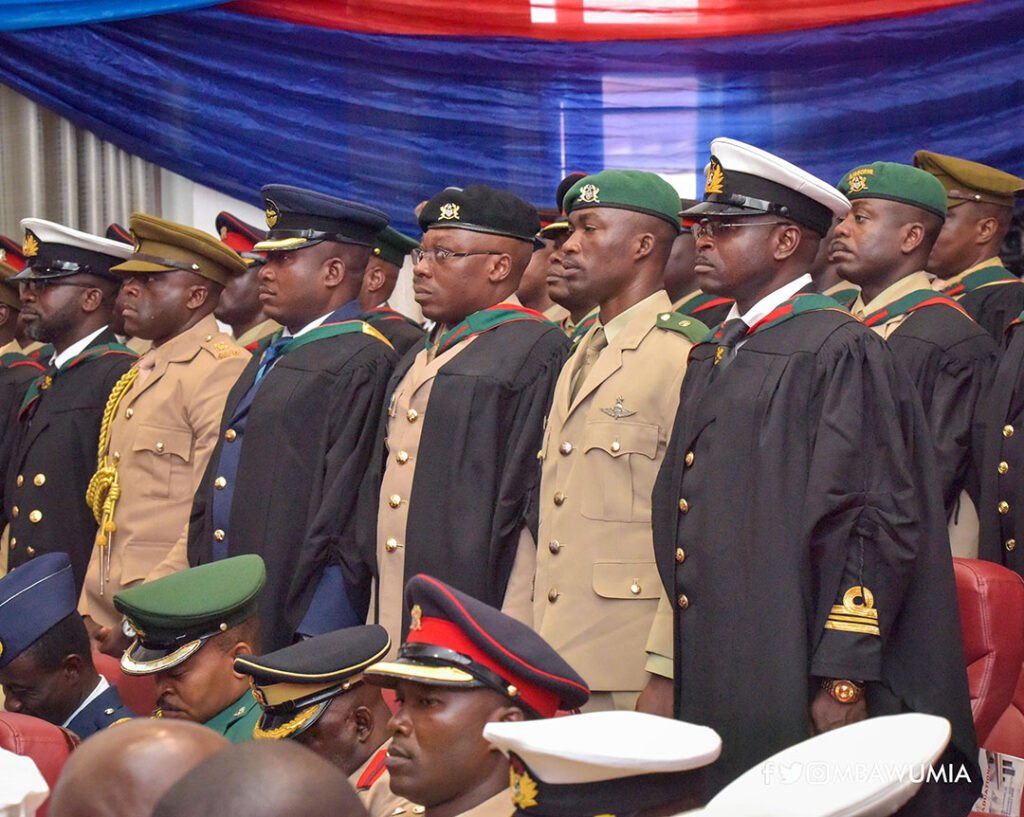ADF STAFF
To prepare security forces to face a wide range of evolving threats, Ghanaian President Nana Akufo-Addo announced that the Ghana Armed Forces (GAF) will establish a war college.
Established with money from the Ghana Education Trust Fund, the institution will train military personnel in modern warfare and expand professional education opportunities for the highest levels of military leadership.
During a speech at the GAF’s 2022 end-of-year West African Soldiers Social Activities celebrations in Accra, Akufo-Addo said he tasked the Ministry of Defence and the Military High Command to begin the process of establishing the college this year.
“It will create a peaceful, secure environment for the growth and prosperity of our nation,” Akufo-Addo said.
The institution is expected broaden the spectrum of training programs already offered by the Ghana Armed Forces Command and Staff College (GAFCSC), which offers courses in defense and military studies, governance and leadership, international politics, administration and management, and crisis and conflict management.
Akufo-Addo also said the GAF will be provided with improved training facilities, logistics and infrastructure to adequately address modern security issues.
The war college is the latest step Ghana has taken to boost its military capabilities.
In April 2022, the nation began bolstering the nation’s military industrial complex to supply its military with equipment. Under the project, about 13 joint venture companies are collaborating with Ghana’s military to manufacture equipment such as ammunition, bullion vans, electronic gadgets, footwear, computers, phones, military weapons, and textiles and garments, Military Africa reported.
The government at the time also committed nearly $18 million worth of construction equipment for military operations and the General Headquarters Office Complex of the Military.
At a counterterrorism conference in Kenya, United Nations Secretary-General António Guterres recently expressed concern that jihadist violence in the Sahel may spill into West Africa.
“It started in Mali, it went to Burkina Faso, Niger and now, when we speak with the presidents of Ghana, Benin, Togo, and Ivory Coast, they say that terrorism is coming to their borders,” Guterres said in a Military Africa report. “I totally believe we are not winning the war against terrorism in the Sahel and that the operation should be strengthened.”
Guterres’ concern has long been held by regional leaders.
Under Akufo-Addo’s leadership, the governments of Benin, Burkina Faso, Côte d’Ivoire and Togo joined Ghana to establish the Accra Initiative in 2017. Mali and Niger contribute as observers. Under the initiative, the nations collaborate on cross-border security and information and intelligence sharing to curb the spread of terrorism.
“West Africa continues to suffer from the effect of the scourge of terrorism and violent extremism spreading rapidly across the region,” Akufo-Addo said in November 2022. “Today, the terrorist groups emboldened by their apparent success in the [Sahel] region are seeking new operational grounds, a development that has triggered the southward drift of the menace from the Sahel to coastal West Africa.”
Adam Bonaa, an international relations and security expert with the Accra-based Institute of Security, Safety, Policy and Research, said he believes that West African leaders also should rely on civilians for information about terrorism and threats.
“We cannot just get up and end it. There has to be proper measures put in place,” Bonaa told Voice of America. “There has to be the willingness on the part of the leaders, but there is a serious disconnect where the citizens are doing one thing and the executives are doing another thing. You cannot fight terrorism without the involvement of the people … and that is not what they are doing.”

